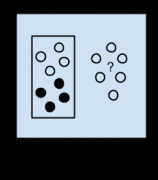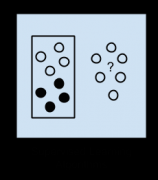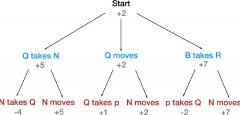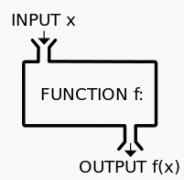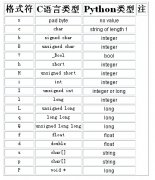Python中itertools模块用法详解(2)
islice(iterable, [start, ] stop [, step]):
创建一个迭代器,生成项的方式类似于切片返回值: iterable[start : stop : step],将跳过前start个项,迭代在stop所指定的位置停止,step指定用于跳过项的步幅。与切片不同,负值不会用于任何start,stop和step,如果省略了start,迭代将从0开始,如果省略了step,步幅将采用1.
def islice(iterable, *args):
# islice('ABCDEFG', 2) --> A B
# islice('ABCDEFG', 2, 4) --> C D
# islice('ABCDEFG', 2, None) --> C D E F G
# islice('ABCDEFG', 0, None, 2) --> A C E G
s = slice(*args)
it = iter(xrange(s.start or 0, s.stop or sys.maxint, s.step or 1))
nexti = next(it)
for i, element in enumerate(iterable):
if i == nexti:
yield element
nexti = next(it)
#If start is None, then iteration starts at zero. If step is None, then the step defaults to one.
#Changed in version 2.5: accept None values for default start and step.
izip(iter1, iter2, ... iterN):
创建一个迭代器,生成元组(i1, i2, ... iN),其中i1,i2 ... iN 分别来自迭代器iter1,iter2 ... iterN,只要提供的某个迭代器不再生成值,迭代就会停止,此函数生成的值与内置的zip()函数相同。
def izip(*iterables):
# izip('ABCD', 'xy') --> Ax By
iterables = map(iter, iterables)
while iterables:
yield tuple(map(next, iterables))
izip_longest(iter1, iter2, ... iterN, [fillvalue=None]):
与izip()相同,但是迭代过程会持续到所有输入迭代变量iter1,iter2等都耗尽为止,如果没有使用fillvalue关键字参数指定不同的值,则使用None来填充已经使用的迭代变量的值。
def izip_longest(*args, **kwds):
# izip_longest('ABCD', 'xy', fillvalue='-') --> Ax By C- D-
fillvalue = kwds.get('fillvalue')
def sentinel(counter = ([fillvalue]*(len(args)-1)).pop):
yield counter() # yields the fillvalue, or raises IndexError
fillers = repeat(fillvalue)
iters = [chain(it, sentinel(), fillers) for it in args]
try:
for tup in izip(*iters):
yield tup
except IndexError:
pass
permutations(iterable [,r]):
创建一个迭代器,返回iterable中所有长度为r的项目序列,如果省略了r,那么序列的长度与iterable中的项目数量相同:
def permutations(iterable, r=None):
# permutations('ABCD', 2) --> AB AC AD BA BC BD CA CB CD DA DB DC
# permutations(range(3)) --> 012 021 102 120 201 210
pool = tuple(iterable)
n = len(pool)
r = n if r is None else r
if r > n:
return
indices = range(n)
cycles = range(n, n-r, -1)
yield tuple(pool[i] for i in indices[:r])
while n:
for i in reversed(range(r)):
cycles[i] -= 1
if cycles[i] == 0:
indices[i:] = indices[i+1:] + indices[i:i+1]
cycles[i] = n - i
else:
j = cycles[i]
indices[i], indices[-j] = indices[-j], indices[i]
yield tuple(pool[i] for i in indices[:r])
break
else:
return
product(iter1, iter2, ... iterN, [repeat=1]):
创建一个迭代器,生成表示item1,item2等中的项目的笛卡尔积的元组,repeat是一个关键字参数,指定重复生成序列的次数。
def product(*args, **kwds):
# product('ABCD', 'xy') --> Ax Ay Bx By Cx Cy Dx Dy
# product(range(2), repeat=3) --> 000 001 010 011 100 101 110 111
pools = map(tuple, args) * kwds.get('repeat', 1)
result = [[]]
for pool in pools:
result = [x+[y] for x in result for y in pool]
for prod in result:
yield tuple(prod)
repeat(object [,times]):
创建一个迭代器,重复生成object,times(如果已提供)指定重复计数,如果未提供times,将无止尽返回该对象。
def repeat(object, times=None):
# repeat(10, 3) --> 10 10 10
if times is None:
while True:
yield object
else:
for i in xrange(times):
yield object
starmap(func [, iterable]):
创建一个迭代器,生成值func(*item),其中item来自iterable,只有当iterable生成的项适用于这种调用函数的方式时,此函数才有效。
def starmap(function, iterable):
# starmap(pow, [(2,5), (3,2), (10,3)]) --> 32 9 1000
for args in iterable:
yield function(*args)
- 上一篇:python迭代器实例简析
- 下一篇:Python中unittest用法实例


